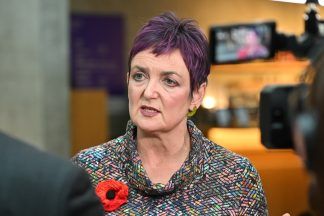NHS Scotland must treat at least 20% more non-emergency hospital cases over the next three years to eliminate the backlog caused by the Covid pandemic, according to new analysis.
The number of referrals waiting to be treated topped 667,000 at the end of December 2023, covering an estimated 10% of the Scottish population.
Without any increase in capacity, researchers calculate the waiting list will jump to nearly one million people by December 2026.
However, treating an additional 32,300 cases per year over the next three years could clear the backlog, experts suggest.
In the early stages of the pandemic, the NHS was forced to postpone elective, or non-urgent, treatments to focus resource on patients seriously unwell with Covid-19. This has led to an accumulation of people waiting to receive care.
Researchers from the Universities of Edinburgh, Oxford and Strathclyde conducted a country-wide analysis of Scotland’s healthcare system over an 11-year period, from January 2013 to December 2023, to estimate the extent of disruption and long-term impact.
The waiting list rose from 285,000 in 2013 to 386,000 at the start of the pandemic in 2019 – a 35 per cent increase over six years. This steady rise suggests the service was already gradually declining before the pandemic, according to the study.
Covid-19 then intensified the decline, researchers say.
By December 2023, there were 668,000 referrals waiting to receive non-urgent treatment – an increase of 73 per cent over four years. 78,000 of those had been waiting for more than a year, compared to just 3,000 in December 2019.
Backlogs were seen across all health boards in Scotland. By the end of 2023, more than half of inpatient and outpatient referrals in most regions were waiting longer than the Scottish Government’s target of 12 weeks.
NHS Borders and NHS Fife were some of the worst-affected health boards for both inpatient and outpatient referrals, with more than double the number of ongoing cases in 2023 compared with 2019.
Researchers say that comparisons between regions should be interpreted with caution, as the figures do not account for differences in population demographics.
The medical specialties where most patients waited more than 12 weeks for both inpatient and outpatient appointments were ENT (Ear, Nose, and Throat), General Surgery, Gynaecology, Oral and Maxillofacial Surgery, and Urology.
Dr Syed Ahmar Shah from the University of Edinburgh’s Usher Institute led the study.
He said: “The NHS’s struggle to meet demand didn’t start with the pandemic – it began years earlier. The pandemic accelerated the decline of an already strained system. Recovery efforts so far have fallen short.
“To turn things around, we need meaningful collaboration between the government and NHS leadership to set realistic recovery plans and ensure adequate funding for their implementation.
“Addressing the current challenges will require a significant and sustained increase in hospital capacity for elective care over several years to tackle the backlog. Long-term recovery also demands a holistic approach, including system-wide strategies like better demand management, prioritising cases by clinical urgency, and improving overall efficiency.”
Health Secretary Neil Gray said: “We know we are still feeling the effects of the COVID-19 pandemic which had an undeniable impact on our NHS. Despite this we are reducing health service backlogs through new capacity at our National Treatment Centres and have provided additional funding this year which will deliver 24,000 outpatient and inpatient appointments and over 40,000 diagnostic tests. We are making progress but know there is more to do.
“That is why our Budget, if passed by parliament, will provide a record £21bn for health and social care, including £200m to reduce waiting lists and improve capacity further. This will help ensure no one waits more than a year for a new outpatient appointment or inpatient/day case treatment by March 2026. I urge Parliament to get behind the Budget.”
Follow STV News on WhatsApp
Scan the QR code on your mobile device for all the latest news from around the country


 iStock
iStock


























